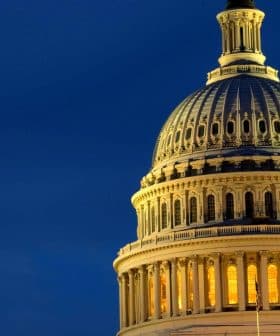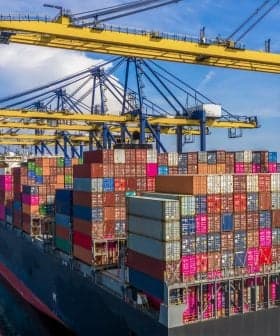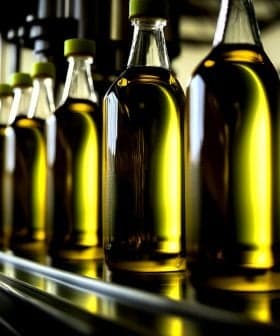Goya CEO Faces Backlash for Praising Trump
Politicians, restaurateurs and consumers are calling for a boycott of the largest Hispanic-owned food company in the United States after its CEO lavished praise on the president.
 Goya Foods CEO Robert Unanue (Getty Images)
Goya Foods CEO Robert Unanue (Getty Images) Goya Foods CEO Robert Unanue praised President Trump at a White House event, leading to backlash and calls for a boycott from prominent figures in the Hispanic community. Unanue defended his comments on Fox News, stating he would not apologize and accusing boycotters of suppressing speech, while the controversy has led to increased calls for boycotting Goya products.
Robert Unanue and Goya Foods have been catapulted into the headlines after the company’s CEO spoke at what should have been a fairly routine White House press event.
During the announcement of an executive order to promote Hispanic Americans’ access to educational and economic opportunities on Thursday, Unanue praised President Donald Trump and said the country was “truly blessed” to be under his leadership.
Let’s be clear GoyaFoods, President Trump has left Latinos and many Americans hungry. Cages Latino Children. Has forgotten the Latino community through this pandemic. Has called Mexicans rapists. We are blessed? I think Latinos we are being mistreated.
“We’re all truly blessed at the same time to have a leader like President Trump who is a builder, and that’s what my grandfather did,” said Unanue, who donated to the president’s 2016 election campaign.
“He came to this country to build, to grow, to prosper. And so we have an incredible builder, and we pray for our leadership, our president, and we pray for our country that we will continue to prosper and to grow,” he added.
In addition to promoting the executive order, Unanue also announced that the company would donate one million cans of chickpeas and one million other food items to food banks throughout the country, in order to help mitigate the impacts of the Covid-19 pandemic.
While it is not unusual for business executives invited to the White House to lavish the president with praise, the chief executive of the immigrant-founded, Hispanic-owned food company has found himself on the receiving end of an unusually strong backlash.
“Let’s be clear @GoyaFoods, President Trump has left Latinos and many Americans hungry. Cages Latino Children. Has forgotten the Latino community through this pandemic. Has called Mexicans rapists,” José Andrés, the Spanish chef and philanthropist, tweeted. “We are blessed? I think Latinos we are being mistreated.”
Other notable figures to criticize the company were Congresswoman Alexandria Ocasio-Cortez and the former secretary of housing and urban development under President Barack Obama, Julián Castro, both of whom suggested a boycott.
Castro, who is now the mayor of San Antonio, Texas, tweeted, “@GoyaFoods has been a staple of so many Latino households for generations. Now their CEO, Bob Unanue, is praising a president who villainizes and maliciously attacks Latinos for political gain. Americans should think twice before buying their products. #Goyaway.”
Many others on social media have added to calls for a boycott of the company, with the topic trending for much of the day. At the time of writing, Goya Foods had not responded to the fallout.
We learned to bake bread in this pandemic, we can learn to make our own adobo con pimienta. Bye. https://t.co/qKHNYfkqCq
— Lin-Manuel Miranda (@Lin_Manuel) July 10, 2020
However, Unanue went on Fox News the following day to defend his appearance with the president.
He said that he would “not apologize” and accused the boycotters of “suppression of speech.” Unanue added that he had worked on similar programs with the Obama administration.
Goya Foods, which sells an array of products including olive oil, has long benefited from a loyal customer base, many of whom are Hispanic.
Over the course of three generations, the company has grown from a modest corner store in New York City to a multinational with $1.5 billion in annual sales.
“We like to say we don’t market to Latinos, we market as Latinos,” Unanue once said.
However, President Trump and his administration’s policies – including family separation of mostly Hispanic migrants at the southern U.S. border and efforts to build a wall between the United States and Mexico – have been viewed unfavorably by most Hispanics.
According to a June 20 poll from the Pew Research Center, two-thirds of Hispanics in the U.S. say they would not support the president’s reelection.
His deep unpopularity with Hispanics has helped fuel the calls for a boycott of Goya products with some chefs and restaurateurs suggesting alternative sources for authentic Hispanic cuisine and ingredients.
“I’ve been waiting for this moment my entire life. I make sazón and I’m not a Trump supporter,” Eric Rivera, the owner of Addo, a Seattle-based food delivery and take-out restaurant, tweeted. “If you support Goya, you support Trump.”
This is a developing story. Check back for updates. (Updated Dec. 17, 2021 20:10)
Share this article









